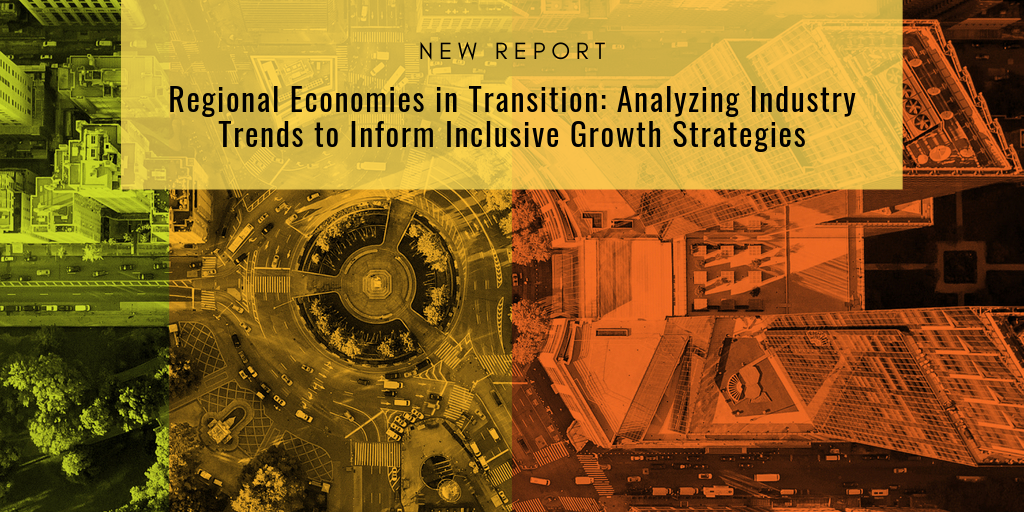New Report Analyzes 150 U.S. Regions’ Economies Sharing Stressors and Solutions in Advanced Industries, Manufacturing and Service Sectors

Economic conditions in the U.S. have become increasingly polarized: despite falling unemployment and steady job growth, economic insecurity has risen dramatically over the last several decades and a third of the nation now lives below 200 percent of the poverty line. These divergent narratives of growth and hardship are partly a product of a rapidly evolving job market, where accelerating technological forces are creating opportunity for some, and leaving many others behind. To foster sustainable growth amid a shifting economic landscape, local leaders must understand how these trends interact at the regional level, where there are crucial opportunities to intervene.
In Regional Economies in Transition: Analyzing Trends in Advanced Industries, Manufacturing, and the Service Sector to Inform Inclusive Growth Strategies, PolicyLink and the USC Program for Environmental and Regional Equity (PERE), with support from the Mastercard Center for Inclusive Growth, analyzes how local economies are adapting to a post-industrial economy. The report presents a typology that classifies the nation’s 150 largest metropolitan areas according to three labor market trends that are key to issues of economic inclusion and equitable growth: (1) the growth of advanced industries, such as computer systems design and chemical manufacturing; (2) the decline of traditional manufacturing jobs; and (3) the quality of jobs in service-sector industries that generally do not require a B.A. degree and are therefore more accessible to economically insecure workers.
“Year after year, jobs reports show growth at the top and bottom of the earnings distribution, and an ever-widening economic gulf between those who have skills that fetch high returns in the new economy and those that do not,” says Justin Scoggins, co-author of the report and Data Manager at PERE. “While there are many pieces to the puzzle of wealth inequality in America, the changes seen in tech, traditional manufacturing, and the service industry are crucial.”
Examining how these three industries have changed during the pivotal period pre- and post-Recession (2005-2015), this categorization of regions helps illuminate the unique challenges and opportunities each region faces [see chart below].
- In regions with thriving tech sectors (Charlotte, NC; San Jose, CA, e.g.), the analysis found that tech industry growth can have spillover effects, increasing the quality of service jobs in a region. These effects alone won’t bolster economic inclusion unless local leaders implement targeted strategies to connect those left behind to quality employment opportunities.
- Though traditional manufacturing is largely on the decline, a handful of regions (Baton Rouge, LA; Houston, TX, e.g.) have breathed new life into their manufacturing sectors. In these places, local leaders should invest in the revitalization of manufacturing, which can provide good jobs for those without a degree, while supporting worker-owned cooperatives and other strategies for bolstering worker power.
- Some regions (Philadelphia, PA) are finding new avenues for job growth and workforce development outside of tech and manufacturing by investing in “eds and meds” — universities and health care systems. Still, these cities must steer growth toward inclusion to combat legacies of racial economic exclusion, and can do so by aligning business development strategies to serve disadvantaged workers and people of color.
In addition to the typology, three case studies were developed representing different regional types outlined in the report, with particular attention to outcomes for economically insecure residents and residents of color: Charlotte, NC; Philadelphia, PA; and, Stockton, CA.
“The path to shared prosperity will require different solutions in different regions, but the goal of building inclusive economies must be a shared one,” says Abbie Langston, co-author of the report and Senior Associate at PolicyLink. “Within a decade the majority of the young workforce will be workers of color. To achieve equitable growth, local leaders must find ways to tap the talent and potential of their diverse workforces and tear down longstanding barriers to economic participation.”
Though strategies for inclusive growth must be tailored to the unique character of each region, the report also highlights policy goals and strategies that are demonstrating success across diverse regional contexts:
“Today’s report is intended to help equip decision-makers with new tools and insights to ensure communities thrive and prosper as they navigate rapid change,” said Sandy Fernandez, director, North America, Mastercard Center for Inclusive Growth. “Working across public, private and non-profit sectors, we can help build digital economies that are inclusive and work for everyone.”